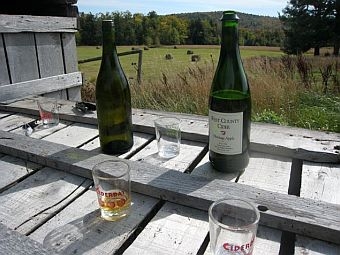 (Host) In Colonial times, making hard cider – the kind with alcohol in it – was a way to preserve the apple crop. It was even used as currency.
(Host) In Colonial times, making hard cider – the kind with alcohol in it – was a way to preserve the apple crop. It was even used as currency.
In recent decades, there’s been a quiet resurgence of craft cider making in New England and New York.
As part of a collaboration of Northeast public radio stations, Nancy Cohen of WNPR reports.
(Cohen) Terry Maloney and his wife Judith settled in western Massachusetts, not far from Vermont, in the early 1970s. They were "locavores" long before anyone had come up with the term. Making cider was a natural because apples were there for the taking.
(Judith Maloney) "We did what our neighbors did which was to get a barrel and fill it and we made some really funky cider. "
(Cohen) Judith Maloney was 28 back then. Terry, who died earlier this year, was 33. Within 12 years the two were selling their first commercial cider, called "West County".
In an orchard in Shelburne, Masssachusetts Judith Maloney picks an apple with greenish yellow skin .
(Maloney) "These are called spitters. You taste it."
(Cohen) Unlike an apple you’d ea, cider apples like this one, called the Dabinett, have less sugar.
(Maloney) "See it’s got a bitterness there."
(Goodband) "Back into the middle of that row there’s Foxwhelp which has a musky flavor."
(Cohen) Ezekial Goodband who manages Scott Farm, part of the Landmark Trust in Putney Vermont, is driving his truck past rows of cider apple trees where he once grew more common apple varieties. He says in some cases he’ll make twice as much money from a cider apple than from a Macintosh.
(Goodband) "Maybe we shouldn’t let that get out, but that’s the economics of it."
(Cohen) Only a tiny portion of his orchard is cider apples, but the demand for them has increased.
(Goodband) "Maybe 20 years ago we’d never have been able to sell all of the cider fruit that we’re growing now. But now we can. We know we’ll sell out."
(Cohen) Today there are about two dozen commercial cider makers in the Northeast. Including Farnum Hill in New Hampshire, Eve’s Cidery in the Fingerlakes region of New York and Sow’s Ear in Maine. Historian Ben Watson, author of Cider Hard and Sweet says the renewed interest in craft cider has been fed by a kind of cultural memory that harks back to a time when people drank it every day.
(Watson) "John Adams used to drink a quart of cider with breakfast every morning and that was not uncommon."
(Cohen) When the Temperance movement came along in the 1800s some farmers went so far as to chop down their apple trees. Watson says other changes also led to the decline of hard cider.
(Watson) "In one respect it was because people moved to the cities from the country and cider has always been a country beverage."
(Cohen) But it’s not a country beverage anymore. It’s sold in upscale restaurants and wine stores in New York City and Boston.
That’s the sound of the launch of a cider business. Peter Mitchell in Hawley, Massachusetts is filtering his first 200 gallon batch.
(Mitchell) "With this year’s harvest this coming winter we’ll be fermenting hopefully 1500 gallons so I’ve got to get used to working with larger batches of liquids."
(Cohen) Mitchell has invested $700,000 into a 20 acre orchard and a state of the art cider mill.
(Mitchell) "I’d like to create something with my own two hands."
(Cohen) Mitchell put in 500 new trees last year. He likes the idea of making something from start to finish. From the apple to the cider.
(Mitchell) "I’m going to ferment to complete dryness until all the sugars are used up and converted to alcohol. It will be more like a crisp dry white wine with a really sharp finish to it."
(Cohen) Mitchell opens a bottle of Terry and Judith Maloney’s cider, called "Heritage Apple".
(Mitchell) "What I like is it has some good sweetness and body to it . You’ve got some nice small bubbles. It’s not over whelming. It’s not going to overflow like a champagne would. And that plays nicely on your palette"
(Cohen) To make cider you don’t need much: just apples. But Judith Maloney says good cider needs something her late husband was able to give it.
(Maloney) "There’s no book that tells exactly how to make cider because what cider really needs is attention."
(Cohen) Judith Maloney is carrying on the cider-making business. She says good cider sits on the table with grace and reminds you of where you are.
For VPR News, I’m Nancy Cohen
(Host outro) Northeast environmental coverage is made possible, in part, by a grant from United Technologies. The reporting is part of NPR’s Local News Initiative.